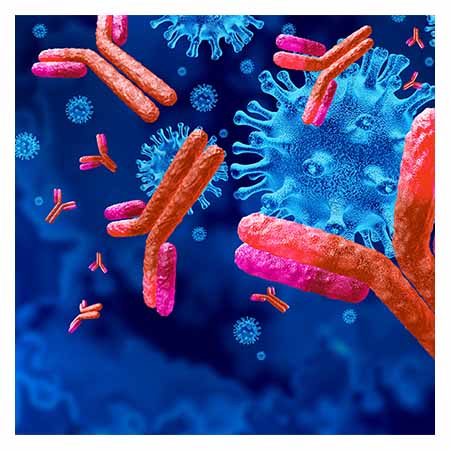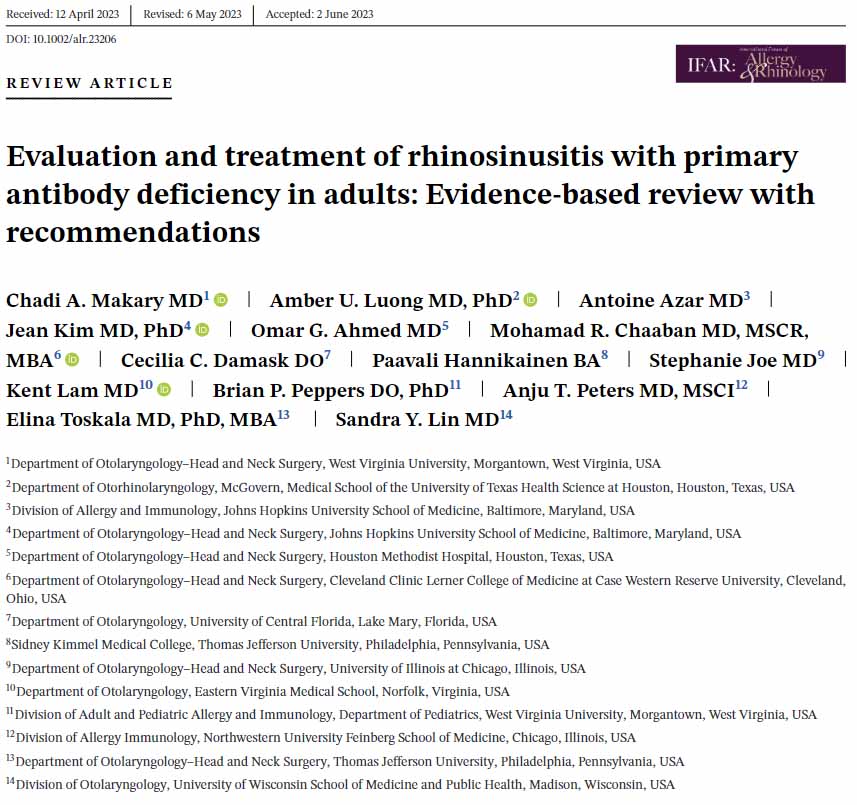Chronic Rhinosinusitis with Primary Antibody Deficiency: An Underrecognized Condition
 Primary antibody deficiency (PAD) can occur in up to 50% of patients with recalcitrant chronic rhinosinusitis (CRS), making a multidisciplinary collaboration with clinical immunology crucial to optimal management of the condition. This conclusion was reached by a multi-institutional team of researchers who reviewed the literature on rhinosinusitis with PAD, summarized current evidence, and made recommendations on the evaluation and management of the condition. Their article was published in the International Forum of Allergy & Rhinology.
Primary antibody deficiency (PAD) can occur in up to 50% of patients with recalcitrant chronic rhinosinusitis (CRS), making a multidisciplinary collaboration with clinical immunology crucial to optimal management of the condition. This conclusion was reached by a multi-institutional team of researchers who reviewed the literature on rhinosinusitis with PAD, summarized current evidence, and made recommendations on the evaluation and management of the condition. Their article was published in the International Forum of Allergy & Rhinology.
Amber Luong, MD, PhD, professor and vice chair for academic affairs in the Department of Otorhinolaryngology at McGovern Medical School at UTHealth Houston, was among the researchers who collaborated on the evidence-based review through the American Rhinologic Society’s Section for Allergy and Immunology in Rhinology (AIR). Dr. Luong was a founding member and first chair of the AIR section.
“When CRS patients do not respond to surgery and postoperative management, those CRS patients without polyps in particular are likely to have an immunodeficiency that should be evaluated,” says Dr. Luong, who holds a joint appointment within the Center of Immunology and Autoimmune Diseases at the UTHealth Houston Brown Foundation Institute of Molecular Medicine for the Prevention of Human Diseases. “The key takeaway for rhinologists and otolaryngologists who see these patients is to consider an evaluation for PAD and referral to a clinical immunologist.”
While multiple studies address rhinosinusitis and PAD, there is little evidence supporting the efficacy of various treatment options. “We need higher-level studies comparing the available treatments, which ultimately may lead to new options for patients,” she says. “Thanks to novel treatments with biologics, chronic rhinosinusitis with nasal polyps – once considered the most challenging condition to treat – has become more manageable. Our new challenge as rhinologists is finding effective ways to treat this group of patients with immune deficiencies.”
Reference
Makary CA, Luong AU, Azar A, Kim J, Ahmed OG, Chaaban M, Damask CC, Hannikainen P, Joe S, Lam K, Peppers BP, Peters AT, Toskala E, Lin SY. Evaluation and treatment of rhinosinusitis with primary antibody deficiency in adults: Evidence-based review with recommendations. Int Forum Allergy Rhinol. 2023 Jun 10. doi:10.1002/alr.23206.
